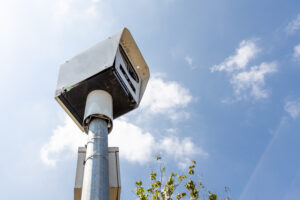Senate panel advances bill to restrict, but not ban, traffic cameras

Close-up on speed trap surveillance camera along highway to control speeding to reduce speeding related accidents.
by Kathie Obradovich, Iowa Capital Dispatch
February 29, 2024
Iowa lawmakers are taking another stab at trying to control traffic cameras with the overhaul of a bill that would restrict the uses and locations of automated law enforcement devices and regulate the revenues generated by them.
Legislators have been wrestling for years over issues posed by the installation of cameras that can detect speeding or traffic signal violations and issue tickets to a vehicle owner. Opponents of the cameras say they’re unconstitutional and serve as revenue generators for cities rather than traffic-safety devices. Groups representing law enforcement and cities have defended the cameras as significant tools for improving public safety.
The two sides have been at a stalemate, but lawmakers are taking two modified approaches this year. One is a bill that combines a ban on traffic cameras with another long-debated proposal that would ban the use of cell phones or other handheld devices behind the wheel. Senate File 2337 is eligible for Senate debate but has not yet come to the floor. Law enforcement groups, despite advocating for the hands-free device language, remain opposed to the bill’s traffic camera ban.
Some representatives of law enforcement and city organizations praised the second approach on Thursday, when an Iowa Senate subcommittee advanced a bill that would allow traffic cameras, but only for cities over 20,000 in population. Those communities would have to obtain a state permit to use the devices and would have to demonstrate a safety issue at the locations where the cameras would operate.
Senate File 489 was introduced in the Senate last year but died after a subcommittee meeting. The bill’s manager, Sen. Mike Klimesh, R-Spillville, said Thursday he plans to seek approval from the Senate Ways and Means Committee for an amendment that rewrites the bill.
“First of all, thank you for listening for law enforcement for understanding their concerns. There is a place for this technology just like there was a place for seatbelts several decades ago. Your amendment is a great start,” David Adelman, lobbyist for the Metropolitan Coalition, said during the subcommittee meeting.
Adelman added that the coalition, which represents the state’s largest cities, still wanted more clarification on where cameras could be located, as well as some other details of the bill.
The bill limits fines that can be charged and allows only for failing to yield or stop at a traffic control signal or railroad crossing, or exceeding the speed limit by more than 10 miles per hour. The original bill also required cities to send 10% of the revenue generated by traffic cameras back to the state’s road fund. The owner of the vehicle would be liable for the fine unless they could show they were not the person driving and give law enforcement the name of the driver.
The amendment increases to 15% the share of revenues the local government has to give up, and restricts how the community can use the remaining funds. Under the amendment, 10% of the revenues above the system operating costs would go into a fund creating an award program for volunteer firefighters and emergency medical service workers based on length of service.
The other 5% would go to the state law enforcement academy for officer training and certification. Communities could use the remaining revenues only for transportation infrastructure improvement projects or to help fund police and fire departments.
The amendment also restricts the use of automated license plate readers, a provision Klimesh said he is still working on.
Sen. Adrian Dickey, R-Packwood, a subcommittee member who supports banning traffic cameras, said he believes advocates of traffic cameras are being more “honest” this year that revenue generation is part of the reason for using them.
“So thank you for a lot of support on acknowledging that it is getting out of control and it is a bit of a wild, wild west on these things,” Dickey said.
He raised several concerns about the bill, however, including arguing that cities should have to give up more of the revenue. He suggested the share going to the grant fund for volunteer firefighters should be 75%. “Why would that city or that entity really give a damn if it’s 10% or 75% if it’s still about the safety aspect of it?”
Klimesh said if the bill passes, the Department of Transportation’s rules process would likely clarify some of the details that speakers were questioning.
Iowa Capital Dispatch is part of States Newsroom, a nonprofit news network supported by grants and a coalition of donors as a 501c(3) public charity. Iowa Capital Dispatch maintains editorial independence. Contact Editor Kathie Obradovich for questions: info@iowacapitaldispatch.com. Follow Iowa Capital Dispatch on Facebook and Twitter.












